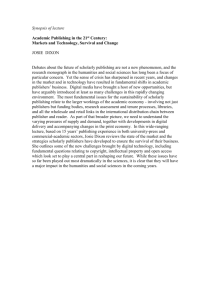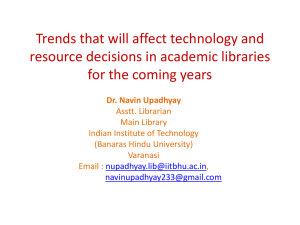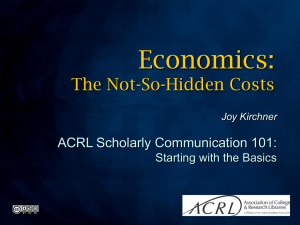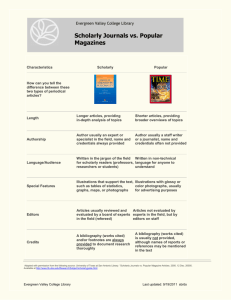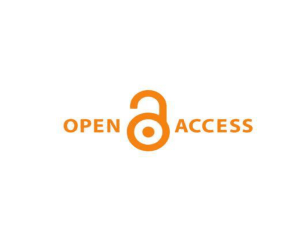590 Course Syllabus
advertisement
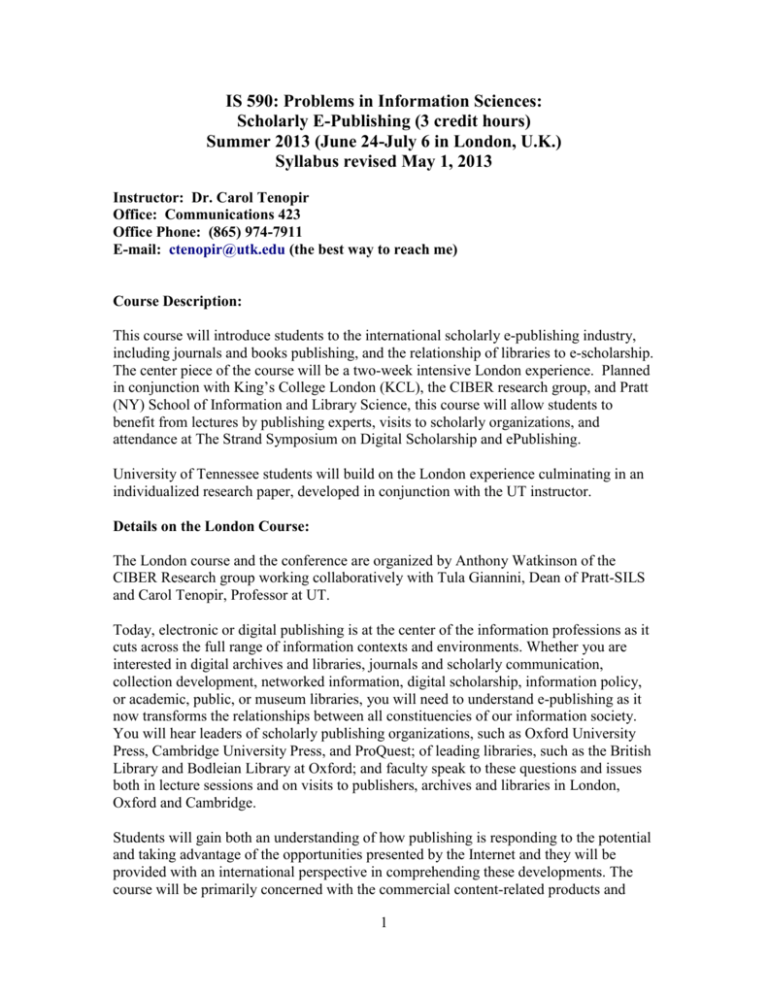
IS 590: Problems in Information Sciences: Scholarly E-Publishing (3 credit hours) Summer 2013 (June 24-July 6 in London, U.K.) Syllabus revised May 1, 2013 Instructor: Dr. Carol Tenopir Office: Communications 423 Office Phone: (865) 974-7911 E-mail: ctenopir@utk.edu (the best way to reach me) Course Description: This course will introduce students to the international scholarly e-publishing industry, including journals and books publishing, and the relationship of libraries to e-scholarship. The center piece of the course will be a two-week intensive London experience. Planned in conjunction with King’s College London (KCL), the CIBER research group, and Pratt (NY) School of Information and Library Science, this course will allow students to benefit from lectures by publishing experts, visits to scholarly organizations, and attendance at The Strand Symposium on Digital Scholarship and ePublishing. University of Tennessee students will build on the London experience culminating in an individualized research paper, developed in conjunction with the UT instructor. Details on the London Course: The London course and the conference are organized by Anthony Watkinson of the CIBER Research group working collaboratively with Tula Giannini, Dean of Pratt-SILS and Carol Tenopir, Professor at UT. Today, electronic or digital publishing is at the center of the information professions as it cuts across the full range of information contexts and environments. Whether you are interested in digital archives and libraries, journals and scholarly communication, collection development, networked information, digital scholarship, information policy, or academic, public, or museum libraries, you will need to understand e-publishing as it now transforms the relationships between all constituencies of our information society. You will hear leaders of scholarly publishing organizations, such as Oxford University Press, Cambridge University Press, and ProQuest; of leading libraries, such as the British Library and Bodleian Library at Oxford; and faculty speak to these questions and issues both in lecture sessions and on visits to publishers, archives and libraries in London, Oxford and Cambridge. Students will gain both an understanding of how publishing is responding to the potential and taking advantage of the opportunities presented by the Internet and they will be provided with an international perspective in comprehending these developments. The course will be primarily concerned with the commercial content-related products and 1 services that impinge on the academic librarian, which in practice means e-journals, ebooks, and database offerings. The emphasis will be on e-journals because of the impact that the development of e-journals and the way they are sold has in academic libraries. There is also recognition that the whole concept of publication may be changing, with new players and new ways of formal scholarly communication now emerging including, for example, libraries as de facto publishers. The course will take advantage of the instructors’ range of connections with major publishers and related organizations. In addition to visits to major publishing organizations, there will be a presentations on both digitization and e-repositories. Communication practices in science, medicine, humanities and social sciences will all be covered. It is intended that the purpose and aims of the vendor will be understood, but at the same time the needs and expectations of the librarian and the users of the digital library will be fully represented. All presentations will leave time for questions and interaction and students will be asked to make presentations on appropriate topics. The ambience will be informal but at the same time conducive to a serious learning experience. All students will attend all lectures and events, normally Monday-Friday, during regular daytime working hours. Occasional evening events may be required as well. The London portion of the course will include the Strand Symposium on Digital Scholarship and ePublishing. The conference promises to be a central event for librarians, publishers and all those concerned with the future of scholarship in the digital environment. Course Goals/Objectives: To understand the functions and purposes of the scholarly publishing industry and its relationships to academic libraries To become familiar with the challenges facing the publishing industry now and into the future To explore potential solutions to challenges and alternatives to conventional publishing in all subject disciplines To meet participants in the scholarly publishing industry To gain an understanding of the international nature of scholarly publishing Methodology: Students will keep a daily journal or blog during the London experience. Students are also expected to participate in discussions during the two week experience, read widely on topics in preparation for the trip and afterwards, and complete an individualized research paper, approved by the instructor. The course grade will be based on participation in the international experience, the daily journal, contributions to the discussions, and the final research paper. 2 Course Assignments: 1. Daily Journal: Students will record their experiences and perspectives on daily activities during the London experience, making a journal entry of at least 2 pages (or approximately 300-500 words plus pictures) for each day of the course (a total of at least 10 entries). Journals may be private or may be a public blog using a system such as Wordpress. You can get a free Wordpress site at http://wordpress.com. If you would rather keep your blog on a Drupal site, Drupal Gardens has free sites - http://www.drupalgardens.com/, or you could re-use your IS567 Drupal site, adding the built-in blog feature. Final ejournals or a link to your blog are to be emailed to the instructor by July 15, 2013. 2. Research Paper: An individualized research paper drawn from the course content and of appropriate length to cover the agreed-on topic is a culminating experience for the course. Most papers will be approximately 5,000-6,000 words (or 15-20 pages). Students will devise their own topic (approved by the instructor); some suggestions are listed below. Papers must be emailed to the instructor at ctenopir@utk.edu by Sunday August 4, 2013. Paper and blog material will be collected by each student during the London experience. This material is critical to producing a paper and blog that represents your individual voice and ensures that they feature original content. Data collection will take several forms: a. b. c. d. e. f. g. h. Lecture notes Handouts from publishers and libraries Your Photographs (please bring a camera) Interviews (where possible, speak with lecturers, librarians, publishers, etc.) Observation (observe with a critical eye) Experiences (carefully consider and analyze your experiences) Readings (before, during, and after the London experience) Discussions The paper will include a: Table of Contents and Cover Page: Make sure to include title, author, course information (title, place, date, instructors, etc.) and Table of contents. Introduction: Clearly define your problem statement and why this topic is important. Literature Review: Identify at least 10 articles on your specific topic. Discuss these in a literature review section of about 3 pages. Make sure to cite all articles. 3 Body of Paper: Present your data and your analysis, commentary and conclusions. Include photos, interview, etc. as appropriate. Make sure to cite all sources, for example, author, place and date of photo or interview. References. Possible Paper Topics: Patron Driven Acquisition of e-books in libraries Gold open access vs. subscription model for financing scholarly publishing Potential uptake and impacts of green open access What do authors of scholarly articles or of textbooks need from a publisher? The future of the scholarly monograph (from either an economic or technological point-of-view) The role of social media in scholarly communication Article of the future—structure, multi-media, etc. Future of journals (from an economic, sociological, or technological point-ofview) Professional society publishers (issues of their role, economics, size, partnerships, etc.) The role of data and datasets in scholarly publishing Anything else of interest, check with me first Student Learning Outcomes and Grading: Student learning is evaluated and graded as follows: Attendance and participation - 25% Students are required to attend all course and conference events during the London experience and participate in discussions Daily Journal -25% Documentation and commentary for each day of course Course Paper - 50% Course Schedule and Due Dates: A pre-meeting with UT’s study abroad office was held in April. On May 8, a pre-meeting with UT instructors and all students is also compulsory. London: June 24-July 6, 2013 (arrive in London June 24, classes begin June 25 9a.m. Classes end July 5 in the evening.) Note that SciData students will check out of the dorms on Monday July 8. The dorms are available after that date if you wish to extend your stay at your own expense. Note that generally days in London will be lecture in the morning, with visits to publishers and/or libraries in the afternoon. Exact dates for these visits are subject to change, but all plans and logistics of how to get where we need to be every day will be explained in London by lead instructor Anthony Watkinson (and logistics for getting to Astor Dorms and to the meeting room at King’s College London will be put on the SciData website.) 4 June 24: Astor Dorms available for check-in June 25: King’s College London, 9-5, and a welcome reception in the evening June 26: British Library, all day June 27: King’s College London, 9-6, The Strand Conference on E-Publishing and Digital Scholarship June 28: King’s College London, 9-5 July 1: King’s College London, 9-5 July 2: Oxford, all day July 3: King’s College London, 9-5 July 4: Cambridge, all day July 5: King’s College London, 9-1pm; dinner and closing session ~6:30-10pm July 6-7: Explore London’s museums and libraries on your own Daily journals due: July 15, 2013 Students’ individual course papers due: August 4, 2013 Technology Requirements: Students are expected to have regular computer, Internet, and e-mail access. Students will also need general word processing and spreadsheet software, such as Microsoft Word and Microsoft Excel, and the ability to access and read Adobe .pdf files. Academic Honesty: Academic honesty requires that all work presented be your own unless it has been clearly specified that work is to be a team effort. The University of Tennessee Graduate Catalog states: Plagiarism is using the intellectual property or product of someone else without giving proper credit. The undocumented use of someone else's words or ideas in any medium of communication (unless such information is recognized as common knowledge) is a serious offense, subject to disciplinary action that may include failure in a course and/or dismissal from the University. Some examples of plagiarism are: Using without proper documentation (quotation marks and a citation) written or spoken words, phrases, or sentences from any source, Summarizing without proper documentation (usually a citation) ideas from another source (unless such information is recognized as common knowledge), Borrowing facts, statistics, graphs, pictorial representations, or phrases without acknowledging the source (unless such information is recognized as common knowledge), Submitting work, either in whole or in part, created by a professional service and used without attribution (e.g., paper, speech, bibliography, or photograph). 5 Readings: Read and explore the following sources before, during, and after the London trip. There are many interesting and relevant articles in these (and other journals or sources). Please share those that inspire you or make you think on your blog: Major professional societies, journals and blogs: Society for Scholarly Publishing, SSP members represent all aspects of scholarly publishing — including publishers, printers, e-products developers, technical service providers, librarians, and editors. SSP members come from a wide range of large and small commercial and nonprofit organizations. They meet at SSP’s annual meetings, in conferences, educational seminars, and Librarian Focus Groups to hear the latest trends from respected colleagues and to discuss common and mutual (and sometimes divergent) goals and viewpoints. Explore their website and library http://www.sspnet.org/resources/ssp-library/ And especially their blog: “The Scholarly Kitchen: What’s Hot and Cooking in Scholarly Publishing”, http://scholarlykitchen.sspnet.org/ D-Lib Magazine http://www.dlib.org/ has many relevant articles, for example: “Rethinking Electronic Publishing” http://www.dlib.org/dlib/july09/giglia/07giglia.html ALPSP--the Association of Learned and Professional Society Publishers. ALPSP has more than 315 member organisations in 39 countries and is the largest international trade association for scholarly and professional publishers. They “aim to serve, represent and strengthen the community of scholarly publishers, and those who work with them. ALPSP provides information, education, representation, cooperative initiatives and guidelines for good practice.” Explore their website www.alpsp.org The ALPSP blog at blog.alpsp.org and especially Learned Publishing, the peer reviewed journal of ALPSP, which has many articles on a broad range of relevant topics http://www.alpsp.org/Ebusiness/ResearchPublications/LearnedPublishing.aspx Association of American Publishers, Three hundred companies are members of the Association of American Publishers. They span all categories of publishing and represent the major commercial, educational and professional companies as well as independents, non-profits, university presses and scholarly societies. Strong on public policy that protects the interests of all types of publishers. http://www.publishers.org/ International Association of Scientific, Technical, and Medical Publishers, http://www.stm-assoc.org/, STM is the leading global trade association for academic and professional publishers. It has over 120 members in 21 countries who each year 6 collectively publish nearly 66% of all journal articles and tens of thousands of monographs and reference works. STM members include learned societies, university presses, private companies, new starts and established players. Check out their publications, reports, and videos from their conferences. SPARC - Scholarly Publishing and Academic Resources Coalition, http://www.arl.org/sparc/ SPARC®, the Scholarly Publishing and Academic Resources Coalition, is an international alliance of academic and research libraries working to correct imbalances in the scholarly publishing system. Developed by the Association of Research Libraries JISC (Joint Information Systems Committee) Collections (UK) https://www.jisccollections.ac.uk/ JISC Collections “supports the procurement of digital content for education and research in the UK.” Especially valuable are their reports and “projects and research”, both tabs on their website. Ariadne – Ariadne is a Web magazine for information professionals in archives, libraries and museums in all sectors. Since its inception in January 1996 it has attempted to keep the busy practitioner abreast of current digital library initiatives as well as technological developments further afield. It concentrated originally on reporting in depth to the information community at large on progress and developments within the UK Electronic Libraries Programme (eLib), covering matters such as information service developments and information networking issues worldwide. It now additionally reports on newer JISCfunded programmes and services as well as developments in the field of Museums, Libraries and Archives within the UK and abroad. Includes many interesting relevant articles, http://www.ariadne.ac.uk Reports CIBER Research Ltd. has many research projects, reports, and articles on various themes of interest to scholarly publishing. http://ciber-research.eu/ Scholarly Information Practices in the Online Environment - Themes from the Literature and Implications for Library Service Development http://www.oclc.org/programs/publications/reports/2009-02.pdf The Economics of Open Access Publishing, http://blog.repec.org/2009/04/24/theeconomics-of-open-access-publishing/ Innovation and the future of e-books (2009- International Journal of the Book), http://www.rand.org/pubs/reprints/2009/RAND_RP1385.pdf Roger Schonfeld and Ross Housewright, US Faculty Survey 2012, Ithaka: 2013. http://www.sr.ithaka.org/research-publications/us-faculty-survey-2012 7 Directory of Open Access Journals, http://www.doaj.org/ The Directory of Open Access Journals. “This service covers free, full text, quality controlled scientific and scholarly journals. We aim to cover all subjects and languages. Travel Requirements: Students will make travel arrangements to London in conjunction with Claire Van Riper in the Center for Information and Communication Studies office through UT’s travel agency, World Travel. Do not make any travel arrangements before talking with Claire. Plan to arrive in London no later than June 24 (when the dorms open) for classes to begin Tuesday June 25 and do not leave before Saturday July 6. SciData students will check out of the dorms on Monday July 8, unless they wish to extend their stay at their own expense. Room Reservations: Housing arrangements at dormitories on the Astor housing on the University College London Bloomsbury campus will be made for you by the UT Study Abroad Office once you are accepted into the class. Dorms do not open until June 24, if you arrive in London earlier you will need to make alternative arrangements for those dates. You are welcome to make reservations to stay beyond July 8 in the dormitories at your own expense. If you do not want to stay in the dormitory you may make your own arrangements at your own expense. The accommodation is for a single room as described with English breakfast. Breakfast is served in Ramsay Hall close to Astor. To make reservations beyond July 8, after consulting with Study Abroad at UT, contact Cherril Fontaine on either 020 7387 4537 or 020 7679 9272 Cherril Fontaine Ramsay and Astor Halls 20 Maple Street London W1T 5HB Tel : +44 (0)207 387 4537 Fax : +44 (0)207 383 0843 email: c.fontaine@ucl.ac.uk 8 ACCOMODATONS: Astor College Residence Hall 99 Charlotte St., London. W1T 4QB A purpose-built, centrally heated residence within five minutes walk of the main UCL campus. There are 250 places in carpeted rooms with washbasins and each room has its own refrigerator. Facilities include TV lounges, piano, a common room, squash courts, gymnasium and launderette. Each room has a computer data point. The Astor College website address is: http://www.ucl.ac.uk/prospective-students/accommodation/virtualtours/astor Nearest Underground stations: Goodge Street, Warren Street, Tottenham Court Road. 9
